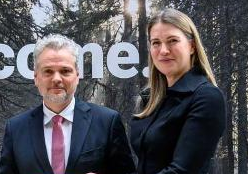~ op-ed was published in Oslobođenje, Nezavisne novine and Večernji list
******
From an energy production point of view, Bosnia and Herzegovina is blessed. With a sunny south, mountains that get plentiful wind, and ample sources of water, this country could be a renewables powerhouse of the Western Balkans. The green transition starts and ends with energy and Bosnia and Herzegovina could enjoy cheap, clean, and sustainable energy for every home and business.
And yet, despite its natural advantages, Bosnia and Herzegovina continues to produce 60 percent of its energy using one of the most polluting energy sources – coal. Unfortunately, most of the coal power plants in the country are old and, therefore more polluting than necessary. Coal power plants, old vehicles and private homes using high carbon fossil fuels in old furnaces leads to urban and industrial areas in Bosnia and Herzegovina on some days being among the most polluted on the planet, condemning children and adults to preventable respiratory and other diseases. According to a study by the World Bank, around 3,300 people in this country die prematurely every year because of air pollution.
The most tragic aspect of this is that it is entirely unnecessary. The resources are there to support fundamental change that brings benefits to all: citizen’s health and wallets, the environment, the impact on climate change and Bosnia and Herzegovina’s economy. All that is needed is the political will and the courage to seize the opportunities on offer. Moreover, Bosnia and Herzegovina has committed to energy transition in the Paris Climate Accords, and progress on the transition would move the country one step closer to the EU.
The EU has earmarked 9 billion euros for the Economic and Investment Plan for the Western Balkans, which is expected to generate a further 20 billion euros in investments. A central plank of this Plan is supporting the Energy and Green Transition and assisting the countries of the Western Balkans to make a shift to more sustainable sources of energy. We also recognise that while the Green and Energy transition is good for all, there will also be impacts for those working in polluting industries. It is for this reason that the EU has allocated financial resources to assist communities in Kakanj and Lukavac, and paired them with traditional coal regions from the Czech Republic and Bulgaria to receive expert support for the process of making the transition away from coal.
Moreover, individual EU member states also provide support for the Energy and Green Transition on a bilateral basis. Sweden, the current holder of the EU Council Presidency is the main bilateral donor in this field in Bosnia and Herzegovina
Today, together with one of our key partners for Bosnia and Herzegovina’s Energy and Green Transition, UNDP, we will be hosted by the cross-party Green Club parliamentarians headed by Saša Magazinović for a discussion among officials, civil society, and businesses in the Parliamentary Assembly of Bosnia and Herzegovina. Our key message will be that energy transition and a better environment are within reach. We will continue to provide support to Bosnia and Herzegovina and work with newly formed authorities to create change.
Energy and Green Transition is not just important for a cleaner environment. It is also crucial to achieve energy security. Soon we will mark one year since the beginning of Russia’s unprovoked and unjustified full-scale war of aggression against Ukraine. The war has first and foremost caused untold suffering for the people of Ukraine. But Russia’s actions have also generated rising prices for people across Europe, including the Western Balkans. This could all be mitigated by political action.
The EU stands ready to support this transition. The stage has been set through Swedish support, implemented by UNDP. A system is in place and now is the time to scale up with EU funds. The EU’s Energy Package, announced by President von der Leyen during her visit to the Western Balkans, allocates as immediate assistance 50 million euros for vulnerable families in BiH to support them with rising prices, and 20 million euros to support energy efficiency in households and businesses. While the immediate support is important and a signal of EU solidarity, long-term transition, for which the EU also provides financial assistance, will bring the more significant benefits for Bosnia and Herzegovina’s citizens in the form of cheaper, clean energy as well as greater energy independence.
Currently, the potential for energy transition is severely curtailed by the legal framework, which hinders large investments. An important first step in that direction would be for newly formed authorities to demonstrate a commitment to energy transition by adopting the National Energy and Climate Plan, as well as the draft Environmental Strategy of Bosnia and Herzegovina for 2030 and onwards. This would unlock investments from the EU and International Financial Institutions.
Alignment with EU standards on energy and environment would generate further benefits and investments. It would also delay the introduction of the EU’s Carbon Border Adjustment Mechanism for Bosnia and Herzegovina, which would otherwise impose steep taxes for Bosnia and Herzegovina’s coal generated electricity exports in the near future.
In this scenario, no one loses. The quality of life and health of BiH citizens depend on it. The EU is a world leader in climate action, and there is no reason why Bosnia and Herzegovina could not be as well. Time to make it happen.

